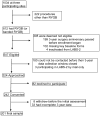Addictive disorders after Roux-en-Y gastric bypass
- PMID: 25862182
- PMCID: PMC4430439
- DOI: 10.1016/j.soard.2014.10.026
Addictive disorders after Roux-en-Y gastric bypass
Abstract
Background: Recent literature suggests that some patients may develop addictive disorders after bariatric surgery, in particular after Roux-en-Y gastric bypass (RYGB). These may include traditional addictions and so called "behavioral addictions," although prevalence data on the latter have not been published. The objective of this study was to establish the prevalence of addictive behaviors in adults after RYGB.
Methods: Participants from a large observational study of bariatric surgery who had undergone RYGB were recruited to complete additional measures. Of 241 consented participants, 201 provided data (i.e., Structured Clinical Interview for DSM-IV Axis I [SCID], additional Impulsive Control Disorder Modules, and various self-report measures, including the Alcohol Use Disorder Identification Test [AUDIT]) to assess status before surgery and in the first 3 postoperative years.
Results: Based on the SCID, 16 (8.0%) developed alcohol use disorder [AUD] within 3 years post-RYGB, 7 (43.8%) of whom had no history of AUD. When both the SCID and AUDIT were used to identify AUD, the corresponding numbers/percentages were 32 (18.4%) and 13 (40.6%). Data on other behavioral addictive disorders indicated 19 (9.5%) had a postsurgery disorder, 6 (31.6%) of whom had no history.
Conclusion: These data add to a growing literature suggesting there is a substantial risk for the development of AUD after bariatric surgery. Understanding the risk for nondrug-related addictive disorders requires more data from larger studies before clear conclusions can be drawn.
Keywords: Addictive use disorders; Alcohol use disorders; Bariatric surgery.
Copyright © 2015 American Society for Bariatric Surgery. Published by Elsevier Inc. All rights reserved.
Comment in
-
Comment on: Addictive disorders after Roux-en-Y gastric bypass.Surg Obes Relat Dis. 2015 Jul-Aug;11(4):905. doi: 10.1016/j.soard.2014.11.025. Epub 2014 Dec 3. Surg Obes Relat Dis. 2015. PMID: 25557161 No abstract available.
References
-
- Flegal KM, Carroll MD, Ogden CL, Curtin LR. Prevalence and trends in obesity among U.S. adults, 1999–2008. JAMA. 2010;303:235–241. - PubMed
-
- Karmali S, Brar B, Shi X, Sharma AM, de Gara C, Birch DW. Weight recidivism post-bariatric surgery: a systematic review. Obes Surg. 2013;23:1922–1933. - PubMed
-
- Sjöström L, Narbro K, Sjöström CD, et al. Swedish Obese Subjects Study. Effects of bariatric surgery on mortality in Swedish obese subjects. N Engl J Med. 2007;357:741–752. - PubMed
Publication types
MeSH terms
Grants and funding
- U01 DK066555/DK/NIDDK NIH HHS/United States
- UL1-RR024153/RR/NCRR NIH HHS/United States
- M01 RR-00037/RR/NCRR NIH HHS/United States
- UL1 RR024153/RR/NCRR NIH HHS/United States
- U01-DK66526/DK/NIDDK NIH HHS/United States
- UL1 RR024996/RR/NCRR NIH HHS/United States
- U01 DK066585/DK/NIDDK NIH HHS/United States
- U01 DK066557/DK/NIDDK NIH HHS/United States
- U01 DK066568/DK/NIDDK NIH HHS/United States
- U01 DK066526/DK/NIDDK NIH HHS/United States
- M01 RR000037/RR/NCRR NIH HHS/United States
- U01-DK66471/DK/NIDDK NIH HHS/United States
- U01-DK66585/DK/NIDDK NIH HHS/United States
- U01-DK66667/DK/NIDDK NIH HHS/United States
- UL1-RR024996/RR/NCRR NIH HHS/United States
- U01-DK66555/DK/NIDDK NIH HHS/United States
- U01 DK066667/DK/NIDDK NIH HHS/United States
- U01 DK066471/DK/NIDDK NIH HHS/United States
- UL1 TR000457/TR/NCATS NIH HHS/United States
LinkOut - more resources
Full Text Sources
Other Literature Sources
Medical
Research Materials


